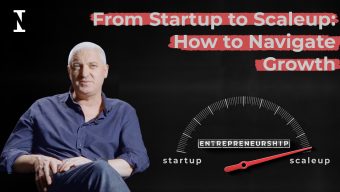GovTech: How Startups Can Help Governments
The GovTech sphere bridges startups and government, enabling agile innovation and technology-driven solutions to improve public services through data, rapid iteration, and collaboration, explains Sofía Silva.
© IE Insights.
Transcription
Startups and government may seem like oil and water for most of us, but it’s actually not like that and you only have to take a look at recent examples like the launch of the healthcare.gov website in the US. It crashed when it was launched because there were too many people going on board. And to get it back up quickly, the US government actually went out to a couple of Silicon Valley entrepreneurs to get it back up.
What they did was basically try and look for that agility. That’s something that is not embedded in government. Government can learn a lot from startups., but a lot of that has to do not just with technology and processes, but rather with their mindset.
When we talk about the GovTech ecosystem, we actually understand that ecosystem as a space where startups, digital SMEs and scale ups leverage new technologies and data to improve public service delivery. So we’re very conscious about the fact that we’re talking about startups, and there is a particular reason for that, and it is because we actually believe that they are effective partners for government.
What startups can actually contribute with is with better situational awareness. They can leverage technology and data to provide other points of information that can inform government, in their decisions. The other aspect is capacities and skills. The methodologies for startups are much more agile and they can actually share a little bit of that with government. Facilitating that adaptability to the broader ecosystem and the broader context of what’s going on.
So if we take a look, for example, at the way startups launch MVPs , it’s a learning situation, it’s a controlled manner in which they’re operating. That risk aspect, it’s quite important in government when you actually get to control that risk you enable for much more innovation to happen within government. They also have very short time to market, and that’s actually completely the opposite in government.
If you take a look at government, governments may design a project one year and develop the project actually three years later, and the context may have changed. You start off a program like this, and the first thing that you ask government teams is what are your challenges? We help them with service design methodologies to actually deep dive into the root cause of their problems.
You land on a challenge statement, publish those challenges into an open call and that attracts the entrepreneurial community. The entrepreneurial community then pitches their solutions to government. And we also facilitate in the meantime so that public sector teams understand what startups actually mean in their proposals. After that process of being guided towards choosing one of the solutions that might fit best, we generate spaces for collaboration and also, training.
So we upskill both public sector and startups into how to work with each other. And this can involve for startups; procurement, B2B strategies and business models and for governments; new methodologies like experimentation, piloting, iteration and so on. Once that process is done, startups and governments actually get together to choose one solution to actually pilot.
And during those pilots, what their differential is that we place lots of emphasis on evaluation and data-based decisions. The ultimate goal of these programs is that public sector teams get a very good idea of what they would need to actually solve that challenge. So when they go on to actually solve it, instead of just testing the solution, they know exactly what to ask for.
And they make informed decisions about large tendering opportunities that are much more costly. It’s not just a couple of startups doing this. It’s actually, a bigger ecosystem. And I think that makes sense because people tend to forget that states are actually the largest employers, one of the biggest data owners and the largest service providers in the world.
And, it’s quite important because not everyone might shop at Amazon, but everyone is a citizen. So transforming governments is quite key in making sure that we’re getting the right services.










